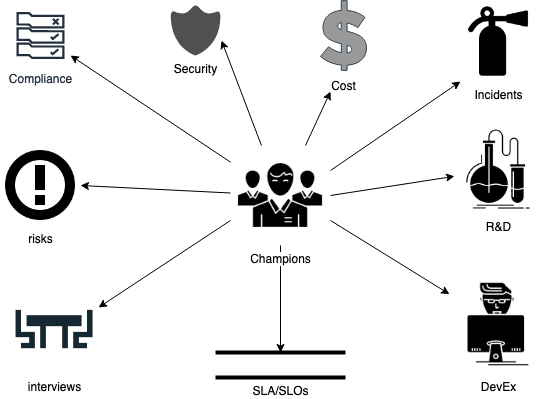Engineering organizations have roles and responsibilities either explicitly or implicitly. When it’s explicit, one or more people exercise the engineering role. The role responsibilities are defined continuously. On the flip side, engineering roles aren’t palpable in some organizations. People take on these roles implicitly. Occasionally they give up on it or leave the organization. Problems can go unnoticed until there is an issue or incident for that particular area. I believe it’s more functional and intuitive when roles are defined and assigned. Engineers and leads can champion different areas for personal growth and organizational health. If someone leaves the organization, it’s clear some areas need attention from other people. Here are the roles and responsibilities each organization should have. Note that my list isn’t exhaustive.

Risk Management
Risk management is identifying, assessing, and controlling risk to the organization. While running services and systems, teams have to evaluate risks regularly. Risks involve using end-of-life software to brittle deployment pipeline. Teams have to address some risks immediately and can postpone others. Champions can keep track of these risks and flag them as the organization moves.
Cost Management
As engineering organization grows, the visibility and predictability of cost become more important. Organizing resources and understanding your expenses can help you to invest in the right technology and cut costs from others. What’s more, building accountability for cost improves self-awareness. Teams can proactively do cost management and bring it into discussions. Cost management champions would help to optimize spending and savings.
Incident Management
Organizations face incidents. Champions can standardize the incident process and help teams with debriefing. Champions can collate learnings and present them to the rest of the organization.
Interviewing
Growing pains come with many interviews. Champions can work on various problems to ask the candidates. They can train engineers to come up to speed with interviewing. They can shadow engineers to give feedback and improve their interviewing skills.
Security
Most big organizations have a dedicated security team or organization. Security group provides guidance and manages security activities. Nevertheless, each team/organization complies with the security team’s suggestions or asks. Champions can make sure the team/s follows this set of recommendations and rules. They can inform the organization about vulnerabilities and mitigations.
Compliance
Compliance standards set a baseline for organizations. Depending on the nature of the business, the organization has to follow a set of rules. Examples of compliance are SOX for financial record-keeping activities and GDPR for data protection and privacy in the European Union. Champions can help the organization to have a holistic view of compliances and talk to the regulatory authorities and stakeholders like the legal team.
SLA/SLO/KPI
Each organization manages many systems and services. Managing expectations for these services require a proper definition of SLA and SLOs. Champions can help teams with defining these SLA/SLOs. They can also ensure each system and service has one. Moreover, champions can help to define KPIs for the organization.
Research and Development
Some of the solutions for software development would be ready either through a service or an open-source. Nevertheless, there are times when the solution doesn’t exist or needs significant work to meet the organization’s needs. Champions can identify these gaps and manage research and development activities. It might be hard to find out prevalent needs for multiple teams. Champions can figure it out by looking over multiple domains and teams holistically.
Developer Experience
Good developer experience unlocks engineering talent’s potential. Inefficiencies in developer experience result in loss of productivity. Medium to large organizations implements several different developer tooling for engineering. Champions can stay up to date with these tooling and inform others in the team about new improvements, updates, and deprecations.